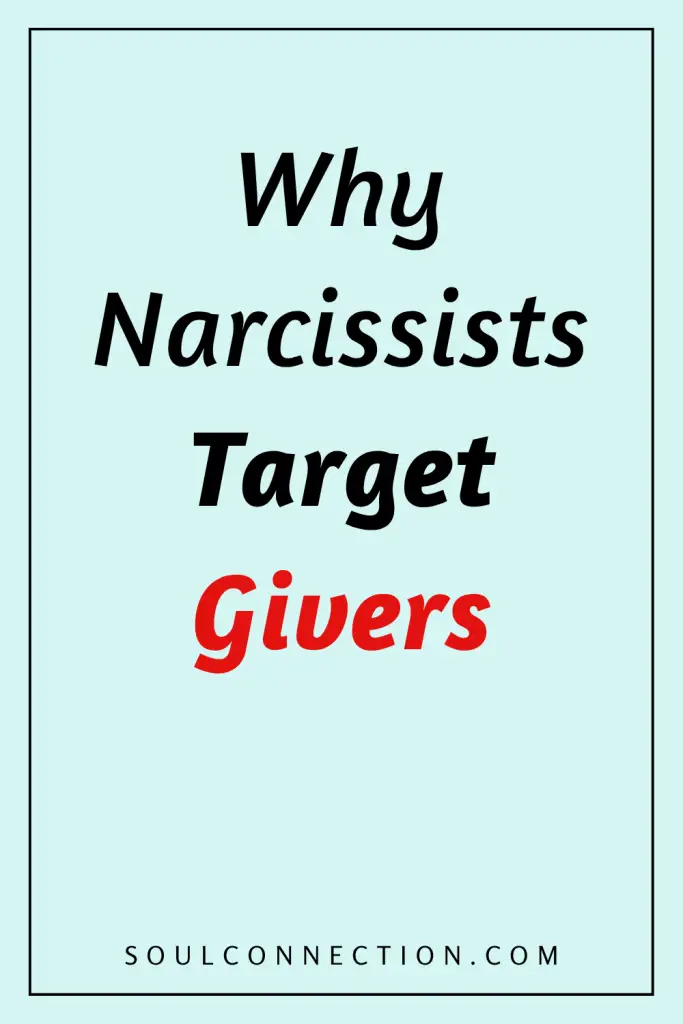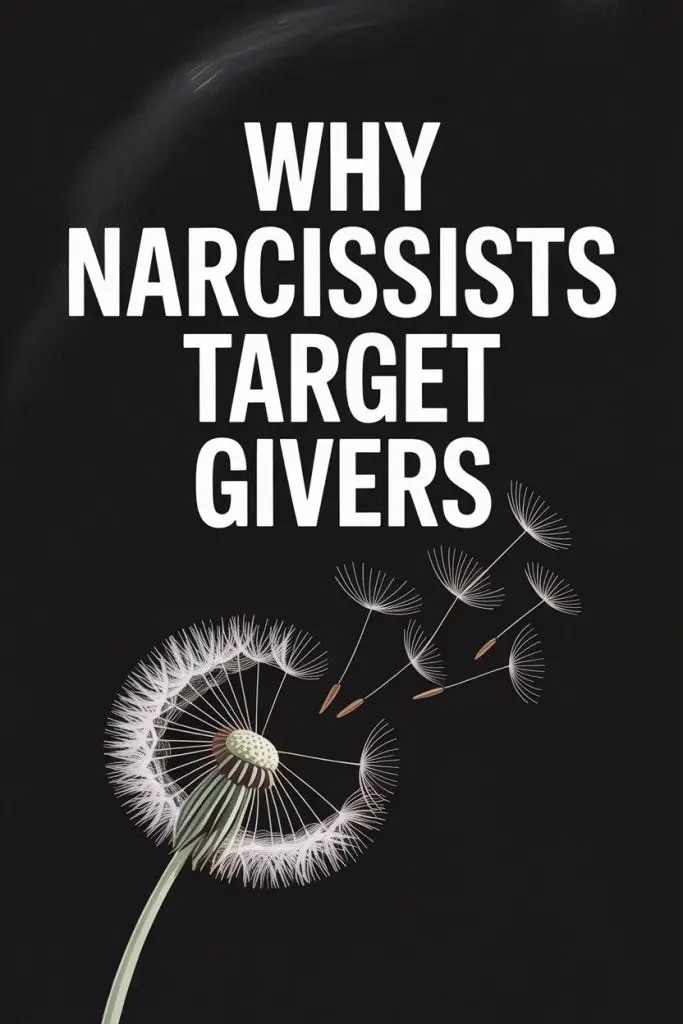Ever notice how some people seem to have a neon sign above their head for narcissists—like a “Free Supply” sandwich board only visible to the emotionally self-absorbed? It’s not your imagination, and it’s not bad luck.
Narcissists have a sixth sense for finding givers and turning them into their personal emotional vending machines. If you’ve ever wondered why, or how to stop serving unlimited emotional refills, you’re in the right place.
The Magnetism Between Givers and Takers
Human relationships are rarely accidental. Narcissists don’t march into a room, spin a wheel, and settle on whichever poor soul is closest.
They scan, they observe, and there’s a method to their madness. Givers—empathetic, generous, eager-to-please types—radiate something irresistible to narcissists.
Think of narcissists as emotional vampires. And givers? Well, they’re the ones who keep leaving their windows open at night.
Why Givers Are So Appealing
Givers have a knack for empathy. They spot distress from across a crowded room and feel compelled to help.
Narcissists, on the other hand, crave praise, attention, adoration, and unwavering support—without ever reciprocating. It’s a match made in dysfunction heaven.
Add to that a giver’s tendency to see the best in people, even when the evidence points elsewhere, and you’ve got a recipe for a one-sided partnership.
Narcissists quickly figure out that givers will twist themselves into emotional pretzels to keep the peace or earn a crumb of approval.
The Narcissist’s Playbook
Narcissists often test their targets early. A small boundary push here, a tiny guilt trip there.
If you apologize for things that aren’t your fault, or if you instinctively rush to fix their feelings, the narcissist takes mental notes. In their minds, you’ve just passed the audition.
Love bombing tends to follow. Compliments, attention, and exaggerated affection make givers feel special—at first.
The catch? Narcissists use this phase to hook their target, making it harder for the giver to spot red flags once the idealization fades and the criticism begins.
Givers, ever hopeful, start working even harder to get back that brief golden period.
The Empathy Trap
Empathy is a beautiful thing. It’s the reason friends reach out, strangers hold doors, and grandmothers send the world’s softest jumpers.
To a narcissist, though, empathy is a resource to be mined. Givers are willing to overlook selfishness or bad behavior, reasoning that “maybe they’re just misunderstood” or “everyone has a bad day.”
The trouble is, with a narcissist, it’s always a bad day. The well of excuses never runs dry, and givers can spend years shoveling out buckets of understanding without seeing the bottom.
The Need to Be Needed
Givers often get a genuine sense of self-worth from helping others. It feels good to be the “fixer,” the one who smooths over problems or brings calm to chaos.
Unfortunately, narcissists exploit this. They present themselves as uniquely wounded or misunderstood, creating endless opportunities for the giver to swoop in as the hero.
It’s not out of malice—at least not on the giver’s end. Many truly believe they can heal or change the narcissist given enough love, patience, and inspirational memes. (Spoiler: that’s not how it works.)
Why Setting Boundaries Feels So Hard
Narcissists are allergic to boundaries. The moment a giver tries to set one, out come the guilt trips and manipulative tactics.
“Why are you being so selfish?” “I thought you cared about me!” “No one else has ever treated me this way.”
For many givers, hearing that kind of feedback is like stepping on an emotional Lego. The discomfort is real, and the urge to backpedal can be overwhelming. Add a bit of “but I love them…” and the cycle continues.
The Cycle of Idealization and Devaluation
Narcissists are experts at cycling between adoration and criticism. During the “good” phase, givers feel seen and cherished—almost like the world’s best partner has finally arrived.
When the devaluation hits, it’s a sharp turn into blame, coldness, or emotional withdrawal.
This roller coaster isn’t random. The highs keep givers hopeful, working ever harder to return to the love-bomb days. The lows keep them off-balance, questioning their worth and second-guessing their instincts.
Narcissists thrive in this chaos; givers get stuck trying to restore order.
Why Givers Stay
Hope is a stubborn thing. Givers hold onto the belief that, with enough understanding or the right approach, things will change. Maybe, just maybe, the narcissist will see the light and start giving back.
Then there’s the shame. Givers often feel embarrassed to admit they’ve been taken advantage of, especially if friends or family have raised concerns.
It’s easier to double down on “fixing” the relationship than to walk away and face the reality that kindness was used as a weapon.
Spotting the Signs Early
Narcissists rarely arrive wearing a “high-maintenance” badge. Early warning signs include a constant need for validation, minimizing your feelings, or a lack of genuine interest in your needs.
Over-the-top charm can be a clue, as can subtle jabs at your self-esteem.
Trust your gut. If you find yourself making excuses for someone’s bad behavior or feeling drained after every interaction, pay attention. Your intuition is smarter than you think (and doesn’t need a spreadsheet to prove it).
Turning the Tables
Change begins with self-awareness. Givers don’t need to become cynical or guarded to avoid narcissists. The key is learning to give from a place of strength, not obligation or fear.
Start small. Practice saying “no” to tiny requests and see how it feels. Check in with your own needs as often as you check on others’.
If someone’s affection feels conditional, or if boundaries are met with anger, take it seriously.
Finding support—friends, a therapist, or even a wise aunt who doesn’t mince words—can help. It’s a lot easier to see toxic patterns when you’ve got someone in your corner.
Moving Forward With Confidence
Life’s too short to spend it refilling empty cups for people who never return the favor. Empathy and generosity are superpowers, not weaknesses, but they’re meant for relationships where both sides give and receive.
If you recognize yourself in these patterns, you’re already ahead of the game. Start treating your own needs as important as everyone else’s.
The right people won’t need you to empty yourself just to keep them happy.
Turns out, the real trick isn’t to stop being a giver—it’s to stop giving to takers. And yes, you can absolutely keep your windows open at night. Just swap out the neon sign for a sturdy screen.


